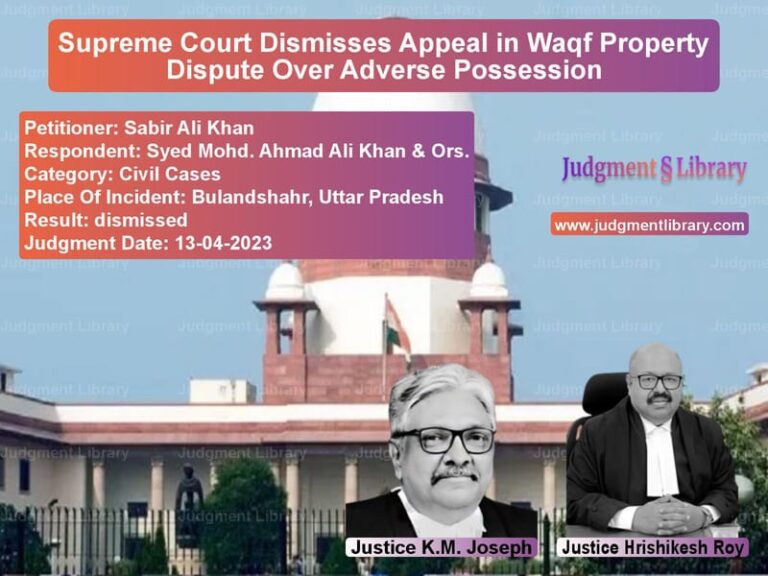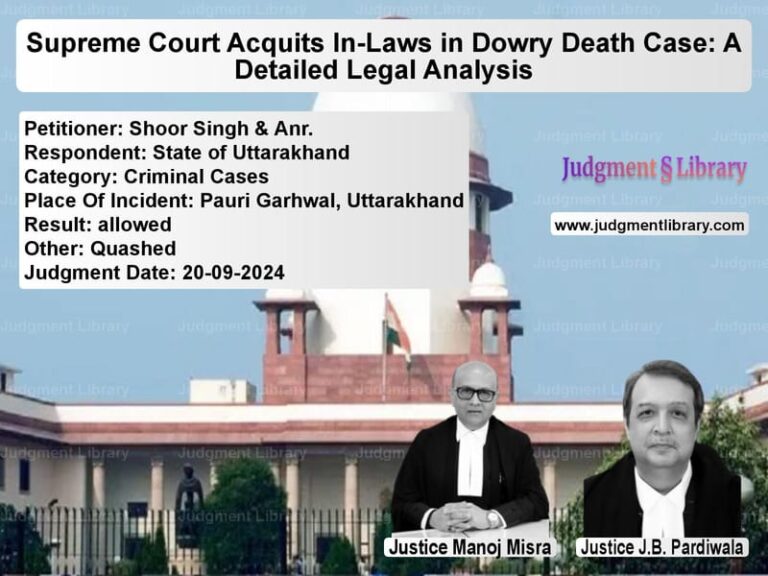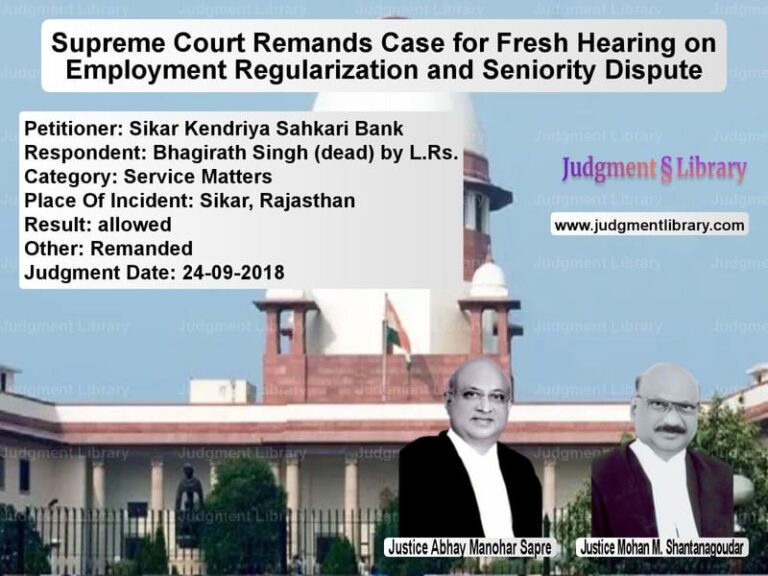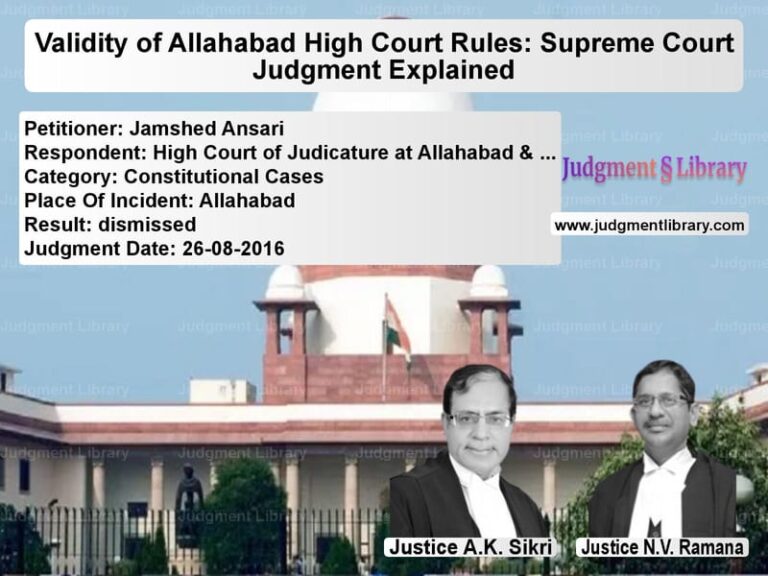Absorption Rights of District Minority Welfare Officers: Supreme Court Ruling in Raja Singh vs. State of U.P.
The case of Raja Singh & Anr. vs. State of Uttar Pradesh revolved around the right of employees who were appointed as District Minority Welfare Officers (DMWO) on service transfer/deputation to claim absorption in the Minority Welfare and Waqf Department of Uttar Pradesh. The appellants contended that they had been serving in these positions for several years and should be absorbed as permanent employees. However, the state government rejected their claim, stating that the 2001 Service Rules did not provide for such absorption.
Background of the Case
In 1995, the Uttar Pradesh government created four new departments, including the Minority Welfare Department. Due to a lack of officers, the government decided to appoint District Minority Welfare Officers through service transfer or deputation from other government departments. The appellants, who were working in different departments, applied for these posts and were selected after an interview process. They were appointed in 1997 with the condition that their deputation would last for two years or until further orders.
However, even after the two-year period ended, the appellants continued serving in their positions. In 2001, the Uttar Pradesh government introduced the UP Minority Welfare Department Gazetted Officers Service Rules, 2001. These rules stated that 75% of the DMWO posts would be filled through direct recruitment via the Public Service Commission, while 25% would be filled through promotions. There was no provision for absorption of officers appointed through deputation or service transfer.
When the appellants requested absorption into the Minority Welfare Department, their request was denied by the state government on August 2, 2002. The government stated that their original departments still held their positions, and there was no legal provision for their absorption. The appellants then filed a writ petition before the Allahabad High Court, seeking a directive for their regularization as DMWOs.
Arguments Presented
- Petitioners (Raja Singh & Others):
- They were selected for the post after undergoing an interview and selection process, which was not merely a deputation but an appointment.
- The government did not repatriate them to their parent departments after two years, indicating that they were considered permanent employees.
- The 2001 Service Rules should not apply retrospectively to their case since they were appointed before these rules came into effect.
- Respondents (State of Uttar Pradesh):
- The appellants were appointed on deputation/service transfer and were never absorbed as regular employees.
- The 2001 Service Rules did not provide any scope for absorption of officers from other departments.
- The appellants had no legal right to demand absorption since their original departments still held their permanent positions.
Supreme Court’s Observations and Judgment
The Supreme Court analyzed the sequence of events and the nature of the appointments. It noted:
“Even though the said letter states that the appellants were appointed by deputation/service transfer, considering the surrounding circumstances that the appellants have undergone the selection process by appearing for an interview before the Committee and that they were selected for appointment shows that it was ‘selection and appointment’ in the Department of Minority Welfare and not ‘deputation’.”
The Court made the following key rulings:
- The appellants were appointed through a proper selection process, not merely transferred on deputation.
- The government failed to send them back to their parent departments, effectively treating them as regular employees.
- The 2001 Service Rules could not retroactively affect their employment status since they were appointed before these rules came into force.
- Since they had served in the department for over two decades, they had a legitimate expectation of being absorbed.
The Supreme Court directed that the appellants be absorbed as District Minority Welfare Officers in the Minority Welfare Department from the date of their appointment. It also ruled that those who had retired must be granted full pensionary benefits as per their service in the Minority Welfare Department.
Conclusion
This judgment reaffirmed the principle that employees who have been serving in a department for a long period under an appointment process should not be arbitrarily denied absorption. The ruling ensures that the state cannot use procedural loopholes to deny legitimate service benefits to employees who have dedicated their careers to a particular department. However, the Court clarified that this ruling was based on the specific circumstances of the case and should not be used as a precedent for other employment disputes.
Petitioner Name: Raja Singh & Anr..Respondent Name: State of U.P. & Anr..Judgment By: Justice R. Banumathi, Justice R. Subhash Reddy.Place Of Incident: Uttar Pradesh.Judgment Date: 06-05-2019.
Don’t miss out on the full details! Download the complete judgment in PDF format below and gain valuable insights instantly!
Download Judgment: Raja Singh & Anr. vs State of U.P. & Anr. Supreme Court of India Judgment Dated 06-05-2019.pdf
Direct Downlaod Judgment: Direct downlaod this Judgment
See all petitions in Employment Disputes
See all petitions in Promotion Cases
See all petitions in Recruitment Policies
See all petitions in Judgment by R. Banumathi
See all petitions in Judgment by R. Subhash Reddy
See all petitions in allowed
See all petitions in supreme court of India judgments May 2019
See all petitions in 2019 judgments
See all posts in Service Matters Category
See all allowed petitions in Service Matters Category
See all Dismissed petitions in Service Matters Category
See all partially allowed petitions in Service Matters Category







